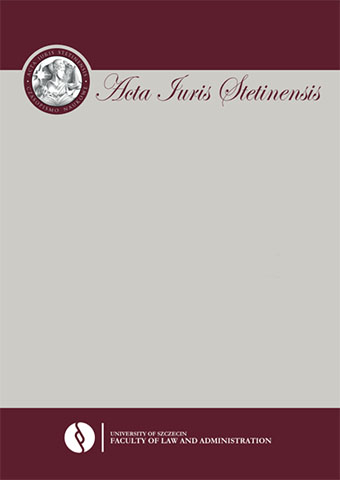| 1. | Azaustre Fernández, M.J., Captación de voluntad en los testamentos y ‘prohibición de confesores’ de Roma a la actualidad, “Glossae. European Journal of Legal History 2017”, no. 14. |
| 2. | Blomberg, E.M., Freiheit und Bindung des Erblassers. Eine Untersuchung erbrechtlicher Verwirklichungsklauseln. Tübingen 2011. |
| 3. | Bosch Capdevila, E. Testamentary Freedom and its Limits, in: Anderson, M., Arroyo i Amayuelas, E. (eds.), The Law of Succession: Testamentary Freedom. European Perspectives. Groningen 2011. |
| 4. | De Amunátegui Rodríguez, C. et. al., Código civil concordado con la legislación de las Comunidades Autónomas de Galicia, País Vasco, Navarra, Aragón, Cataluña y Baleares. Madrid 2008. |
| 5. | De Benito Fraile, E.J., La codificación civil y los derechos forales (1808-1833), “Cuadernos de Historia del Derecho” 2012, no. 19. |
| 6. | Dittrich, L., Verfassungsrechtliche Vorgaben des Erbrechts, “Zeitschrift für Erbrecht und Vermögensnachfolge” 2013, vol. 1. |
| 7. | Ellenberger, J., § 138, in: Palandt, Bürgerliches Gesetzbuch, München 2017. |
| 8. | García Pérez, R., Derechos forales y Codificación civil en España (1808-1880), “Anuario de historia del derecho español” 2012, no. 82. |
| 9. | García Rubio, M.P., Plurilegislación, supletoriedad y derecho civil, in: González Porras, J.M., Méndez González, F.P. (eds.), Libro homenaje al profesor Manuel Albaladejo García. Tomo I. Murcia 2004. |
| 10. | Hirsch, A.J., Wang W.K.S., A Qualitative Theory of the Dead Hand, “Indiana Law Journal” 1992, vol. 68. |
| 11. | Kroppenberg, I., „Wer lebt, hat Recht“ – Lebzeitiges Rechtsdenken als Fremdkörper in der Inhaltskontrolle von Verfügungen von Todes wegen, “Deutsche Notarzeitschrift” 2006, vol. 2. |
| 12. | Lange, H., Kuchinke, K., Erbrecht. München 2001. |
| 13. | Leipold, D., § 2074, in: Kessal-Wulf, S. (ed.), Münchener Kommentar zum BGB. Band 11. Erbrecht. München 2020. |
| 14. | Lenz, N., § 2074 in: Hau, W. (ed.), juris Praxiskommentar BGB. Erbrecht. Band 5. Saarbrücken 2007. |
| 15. | Litzenburger, W., § 2074, in: Bamberger, H.G. et. al., Beck'scher Online-Kommentar BGB, München 2020. |
| 16. | Longchamps de Bérier, F., Ręka zza grobu? Wokół granic dysponowania majątkiem na wypadek śmierci w prawie rzymskim in: Grodziski, S. et. al. (eds.), Vetera novis augere. Studia i prace dedykowane Profesorowi Wacławowi Uruszczakowi, Kraków 2010, vol. I. |
| 17. | Niezbecka, E., Ustanowienie spadkobiercy i zapisobiorcy w testamencie, “Rejent” 1992, no. 6. |
| 18. | Osajda, K., Ustanowienie spadkobiercy de lege ferenda, “Studia Prawa Prywatnego” 2009, vol. 1. |
| 19. | Otte, G., in: Otte, G. (ed.), J. von Staudingers Kommentar zum Bürgerlichen Gesetzbuch mit Einführungsgesetz und Nebengesetzen. Buch 5. Erbrecht. §§ 2064-2196 (Testament 1), Berlin 2003. |
| 20. | Owsiński, P.A., Paluch, A., Zum sprachlichen Weltbild in ausgewählten Begriffen aus dem Bereich des Erbrechts in der deutschen und polnischen Sprache, “Colloquia Germanica Stetinensia” 2020, no. 29. |
| 21. | Plaza Penadés, J., El Derecho Civil, los Derechos Civiles forales o especiales y el Derecho Civil autonómico, “Revista Electrónica de Derecho Civil Valenciano” 2012, no. 12, https://core.ac.uk/download/pdf/71025569.pdf, access: 09.08.2020. |
| 22. | Quesada González, M.C., La institución de heredero sometida a condición, a término o a modo. Madrid 2018. |
| 23. | Schlüter, W., Grenzen der Testierfreiheit – Grenzen einer „Herrschaft aus dem Grabe“ in: Hadding, W. (ed.), Festgabe Zivilrechtslehrer 1934/1935. Berlin-New York 1999. |
| 24. | Sesta, M., Codice delle successioni e donazioni. Volume I. Costituzione e Quattro Codici. Milano 2011. |
| 25. | Vaquer Aloy, A., Libertad de testar y condiciones testamentarias, “InDret” 2015, no. 3. |
| 26. | Weidlich, D., § 2074, in: Palandt, Bürgerliches Gesetzbuch, München 2018. |
| 27. | Wilke, U., Willensherrschaft und Nachlassbindung, Frankfurt am Main 2017. |






